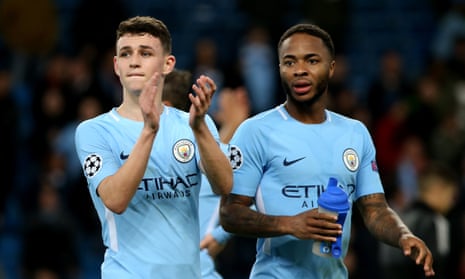“It’s Mars Next Stop,” was the back-page headline in the Daily Express on 13 May 1968. Manchester City had won the championship and, though it was another 40 years or so before the term “noisy neighbours” was applied (copyright: Sir Alex Ferguson), it is fair to say they had no intentions of going about it quietly.
Their manager, Joe Mercer, set the tone in the week building up to the game at Newcastle in which they clinched the title, announcing to the newspapermen that he had already been practising the walk to Stretford to collect the trophy from Manchester United, the reigning champions. “I shall personally take great pleasure in walking down to Old Trafford on Sunday morning to pick up the trophy.”
Unless, of course, his assistant, Malcolm Allison got there first. Allison’s prediction was that City would “terrify Europe to death” the following season. “There is no limit to what this team can achieve. We will win the European Cup. European football is full of cowards and we will terrorise them with our power and attacking football. I think we will be the first team to play on Mars.”
Not quite. City were drawn against Fenerbahce in the first round. Mercer’s team drew 0-0 in Manchester, lost the return leg 2-1 and never made it further than Istanbul. All of which, one imagines, was a source of considerable amusement at Old Trafford bearing in mind Allison used to walk in front of the Stretford End before derbies, holding up five fingers to predict the score and gesturing as if flicking away United like dirt.
Allison once admitted that he “loathed the bumptious, patronising tones of some of their players, their hangers-on and many of their supporters” and nor was he a particularly gracious guest, a few days after arriving in Manchester in 1965, when he was invited to United’s league championship dinner and Matt Busby, mid-speech, recognised him in the audience. Busby asked everyone to welcome him as an outstanding coach who would provide strong competition. “You can bet on that, Matt, baby,” Allison, 18 years his junior, responded. Different days, indeed.
The history between these two clubs is always fascinating and it can be a pity sometimes, in these sanitised days of media training and PR sensibilities, that none of the main protagonists in the current battle for supremacy – not even, most surprisingly, José Mourinho – wants to be accused of disturbing the peace.
Yet this is a deliberate policy now at City: achieve first, talk afterwards. The modern City have realised that a club at the top do not have to shout so loud to be noticed and, quietly, are just getting on with their business, free of controversy or confrontation. There is no need for one-upmanship now such as the Carlos Tevez “Welcome to Manchester” poster or all those times when new signings would be drilled, parrot-fashion, to recite lines about City being the club with more local supporters.
In reality, it has always been silly to think United fans do not exist in huge numbers in Manchester and, deep down, most sensible City fans would admit it, too. Ian Niven, who had a 30-year stint on the club’s board, used to say that out of 200 people in his office he could find only half a dozen City supporters. It is not an exact science, perhaps, but Mark Hodkinson’s 1999 book, Blue Moon, offers a different gauge. Hodkinson recalls how the old Booth Hall children’s hospital in Blackley had a poster of George Best at one end and, at the other, Colin Bell. Choose your end, choose your team. “Where it was once blue, red, blue, red, it is now red, red, blue, red,” the author writes. “The kids are United.”
It is a different city now, football‑wise, and one of the legacies of the Abu Dhabi era is that there are a lot more children in blue shirts kicking balls around in the local parks than there were 20, 10 or even five years ago. The numbers have evened up and it will continue that way as long as City give the impression that something special is brewing behind the glass doors of their village-sized training ground.
No football team has been crowned champions in the last week of November but, unless something changes soon, there has to be a possibility that this season’s title could become the most exhilarating one‑horse race there has ever been.
Pep Guardiola’s men have already scored 40 times from their opening 12 games and, at the current rate, are on target to finish the season with 130-plus goals, smashing all previous records into smithereens. Their goal difference, plus 33, is higher than the goals-scored column of any other side, despite playing a game fewer than all but five clubs, and their unbeaten run actually stretches back 25 games, over seven months, in all competitions. They go to Huddersfield on Sunday with an immaculate record from their away fixtures since the start of the season. Aggregate score: 26-6.
The number-crunchers at Premier League HQ can also come up with figures that show City went into the latest fixtures with a higher pass count, 8,708, than the combined totals of any two clubs from Newcastle, Leicester, Burnley, Stoke and West Bromwich. Not everyone is a fan of possession statistics but Guardiola’s philosophy is generally a good one: keep the ball, wear down the opposition. Of the 10 players with the best passing statistics in the Premier League, five were from the side at the top of the league.
It doesn’t make City immune to the pressures of leading from the front and it would be foolish to assume opponents cannot find vulnerabilities, especially now John Stones is absent, with Vincent Kompany always fragile and Nicolás Otamendi still to learn that the best central defenders do not put themselves on the floor if they can avoid it.
At the same time, the important thing to remember is that City’s planning extends a long way beyond the period when Stones will be missing. City’s under-18s, under-15s, under-14s, under‑10s and under-nines all won trophies last season. The under-18s beat United 4-1 on Saturday and the under‑16s won 5-3 in their own derby. The women’s team won a clean sweep of the domestic honours last season and are flying again. It is an empire the club wants to create, even after Guardiola is gone, and if there is one thing the people in Abu Dhabi do not want it is short-termism.
True, the attendances at the Etihad for Champions League ties have been disappointing sometimes and City’s fans have had to grow wearily accustomed during the transformation of the club to jokes about empty blue seats. The bottom line, though, is that Premier League fixtures always tend to be sold out and planning permission has been approved for the next stage of the stadium development, to take the capacity above 60,000.
It will still leave them some way behind Old Trafford’s 75,600 capacity but, equally, just consider the different mindsets of the two clubs. United have been deliberating for at least 10 years about whether to develop what is now known as the Sir Bobby Charlton Stand and the complications of extending it over the adjacent railway line. Hypothetical, perhaps, but if City’s owners had been in that position they would have found a way and done it a long time ago.
Can anyone stop them? That question, plainly, should not just apply to the current season and it is very clear United, and all the rest, are going to have their work cut out in the next five-to-10 years, possibly longer. Guardiola et al might find it difficult to get to Mars but it is possible they might reach previously unexplored heights of greatness.
Wenger lashes out despite blind spots
Arsenal’s visit to Burnley Sunday is perhaps an opportune moment for Arsène Wenger to remember that it is not just his players, as he frequently appears to suspect, who suffer from the occasional refereeing injustice.
It is certainly difficult to think of a more calamitous decision in the Premier League last season than Laurent Koscielny’s stoppage-time winner in the corresponding fixture at Turf Moor. There was the matter of offside from Alex Oxlade-Chamberlain’s swing at the ball and it was going wide until it diverted in off Koscielny’s arm – though, naturally, Wenger claimed not to have seen it, to add to the already considerable file of other controversies he has mysteriously missed over the past two decades.
Wenger, one imagines, would have had a perfect view if the same had happened at the other end and his team had lost, rather than won, 1-0. Suffice to say, he might also have reacted a lot more strongly than Sean Dyche, with the Burnley manager restricting himself to saying the referee, Craig Pawson, was in for a “tough night”.
There is an argument that Wenger would never have been so successful if he was not such a sour loser. It is still an unattractive trait, however, when he refuses to acknowledge the mistakes that go in Arsenal’s favour but stacks up all sorts of exaggerated, sometimes make-believe, grievances the other way. His recent verdict on Raheem Sterling, abusing him as a diver after a perfectly legitimate penalty decision, was just the case in point.
As well as handball and offside, there were questions about Koscielny’s 93rd-minute winner standing despite the fourth official indicating only two minutes of stoppages and no other obvious delays in that time. More people should remind Wenger of these moments the next time he is complaining his team are hard done by.
Hammers boxed in by shoppers
Ever since West Ham moved to the former Olympic Stadium it has been widely known they would seek special dispensation to have away fixtures on Boxing Day because of the huge crowds of people visiting the Westfield shopping centre next door.
Fair enough, I suppose, even if it is just another reminder why so many of the club’s supporters preferred life at the old place, where the queues for Nathan’s Pies and Eels or a plate of bubble and squeak at Ken’s Cafe could stretch into the street but were never enough to shut down the football.
It does seem strange, though, that West Ham could then have their game against Leicester amid the potential chaos of Black Friday, when some of the more dedicated bargain hunters in the pre-Christmas sales give the impression they would hold their own against the Inter-City Firm, or every other hooligan mob in London, if it meant getting a cheap microwave.

